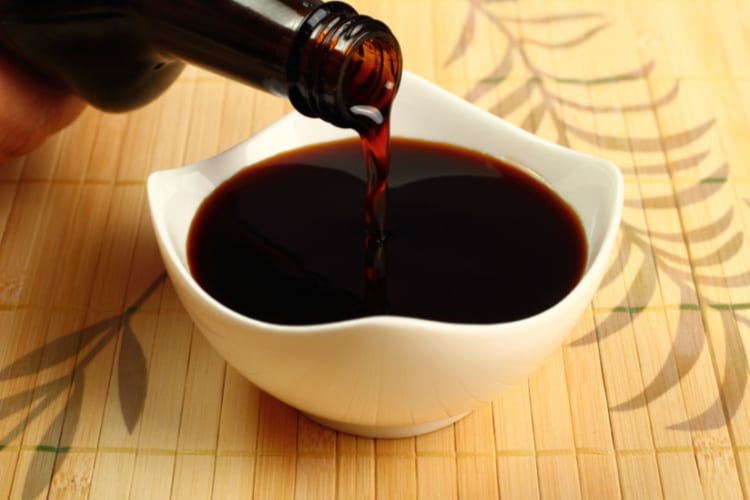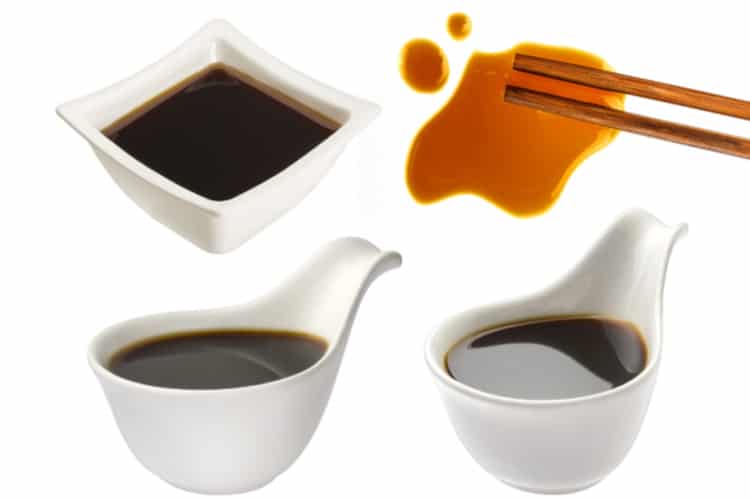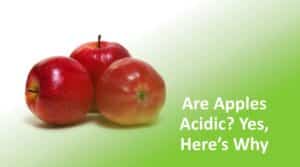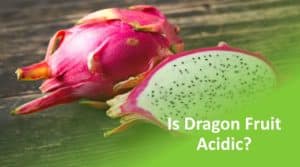Soy sauce has a pH value that ranges between 4.4 and 5.4, making it an acidic sauce. If you are curious to see what makes it acidic, whether it makes it bad for people with acid reflux, and whether there is a way to reduce the acidity, then you’ve come to the right place.

What Makes Soy Sauce Acidic?
Soy sauce is made from fermented soybeans and, like most fermented dishes, it contains lactic acid, which gives it its signature taste and acidity. Other typical ingredients are wheat and koji —a bacterial culture that helps the fermentation process — as well as water and salt for brine.
Soy sauce contains 1.0% lactic acid and trace amounts of other acids such as oxalic acid, tartaric acid, malic acid, and acetic acid.
The PH of Soy Sauce
The exact pH level of a soy sauce depends on the brand and how it’s produced, but it’s usually around 5. The pH range is between 0-14, and anything lower than a 7 is acidic.
If you aren’t sure where the particular brand you’re using lands, you can take a pH strip and easily test the acidity level of your favorite bottle at home.
How Long Does Soy Sauce Take to Ferment?
The key to making soy sauce lies in the fermentation process. Traditionally, the fermentation process can last several months to several years before the product develops that distinctive umami (that rich, meaty, and savory taste) we associate with it.
The length of the fermentation process determines the pH of the soy sauce. The longer it ferments, the lower its pH value will be. This means that brands that ferment longer are more acidic.
Just as is the case with many fermentation processes, external factors affect the quality and taste of the soy sauce. These factors include but are not limited to the temperature and the moisture inside the facility where it ferments and the pH of the container the fermentation takes place in.
Thanks to the advancement of industrial technologies, nowadays, the maturing process can be accelerated by mimicking these factors artificially.
Is Cooked Soy Sauce Acidic?
It’s true that the acidity of soy sauce reduces significantly when cooked. However, if you wish to reduce it even more, you can sprinkle baking soda into your dish as you cook.
Baking soda is alkaline, meaning it has a higher pH, so it lowers the acidity of the dish. But make sure you don’t go overboard — you can add up to ¼ teaspoon of baking soda per serving to lower the acidity of your meal without changing its taste.
Note that this will only work if the baking soda is added slowly as the food is cooking. If you add it at the very end, the acidity will not change.
Are All Soy Sauces Equally Acidic?
Even though all soy sauces are acidic, meaning they all have a pH level lower than 7, they aren’t always equally acidic. In fact, some aren’t even that sour. For example, the Japanese variety is much sweeter because it contains more wheat than the traditional Chinese one.
Health Effects of Eating Soy Sauce
Unless you have a dietary restriction that prevents you from eating soy sauce, you can consume it as you please. However, if you are allergic to soy and processed soy, you should NOT consume soy sauce. If you have chronic acid reflux, regular consumption may trigger your symptoms.
Since soy sauce is quite acidic, consuming it may aggravate your discomfort if you are already experiencing symptoms of acid reflux. Gastroesophageal reflux disease or GERD happens when the natural acid in your stomach finds its way to the tube connecting your stomach and mouth.
This is called acid reflux, and it may irritate your throat and esophagus, giving you heartburn. Those with GERD and acid reflux should approach soy sauce and dishes made with it with caution, particularly when they are experiencing symptoms.
Is Soy Sauce Bad for Acid Reflux (GERD)?
The answer is not a definite yes or a no. If you are experiencing symptoms, it would be better for you to avoid it so as not to let it aggravate your condition further.
Depending on how your stomach feels on a given day, it may not aggravate you, but you need to find your own limit when it comes to soy sauce consumption.
If you are unsure about consuming soy sauce, make sure to consult a healthcare professional.
Alternatives to Soy Sauce

Tamari, Worchestershire sauce, and coconut aminos are a few alternatives to soy sauce. Tamari and coconut aminos are pH neutral and are great alkaline substitutes, whereas Worchestershire sauce is 3.84 on the pH scale, which makes it highly acidic.
All three options are both vegan and gluten-free and great alternatives to soy sauce if you’re looking to curb how much of it you consume. If you are looking to substitute it because of its acidity, you may want to steer clear of Worchestershire sauce.
If you want to learn other replacements for soy sauce, check out our article on soy sauce substitutes.
FAQ
Is Soy Sauce Gluten-Free?
Since one of the main ingredients in soy sauce is wheat, most brands are not gluten-free. However, there are brands out there that make gluten-free soy sauce. Another gluten-free alternative is a soy sauce substitute made from coconut tree sap and sea salt called Coconut Secret.
Which Soy Sauce Is the Best?
Well, it depends on the dish. There are many different brands out there that go well with different kinds of food. Are you going to cook Chinese food or Japanese food? Do you need your dish to be low in sodium or gluten-free?
For example, if you are cooking Chinese food, you may want to use a Chinese variety, which has molasses and sugar and has a sweeter taste. Japanese brands, on the other hand, are usually a bit more salty and acidic because they might contain additives like mirin, which is rice vinegar.
The duration of fermentation is a factor that determines the quality of a particular brand. Since most brands of soy sauce in the market are fermented only for several months, their flavor profile is very different from brands that ferment their product for a longer period of time.
Certain soy sauces are considered a delicacy as they ferment for 4 years. This allows the final product to have a mellower and sweeter taste that goes exceptionally well with sushi and cooked fish or meat. In fact, these types of aged soy sauces are also (surprisingly) enjoyed with vanilla ice cream.






